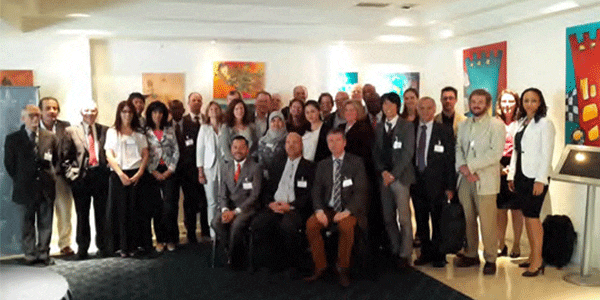Renee St. Denis, vice president of Sims Recycling Solutions, and Patricia Whiting, senior international policy analyst for Sims Recycling Solutions’ original equipment manufacturer (OEM) compliance team, participated in the first meeting of the Basel Convention’s Expert Working Group on Environmentally Sound Management (ESM) in Buenos Aires, Argentina from December 10-12, 2013. This working group is a product of the Basel Convention’s Country-Led Initiative (CLI), which determined that despite a significant body of historical work by Parties of the Convention to prevent adverse impacts to human health and the environment through ESM of hazardous waste, instances of mismanagement of hazardous waste continue to occur.
Co-chaired by Dr. Andreas Jaron of the German Ministry of Environment (MOE) and Mr. Alberto Santos Capra of the Argentinian MOE, the CLI ESM Working Group is tasked with developing multidisciplinary mechanisms to promote the ESM of hazardous and other wastes pursuant to the Basel Convention. The CLI ESM Working Group took a view toward practically defining and outlining what needs to be in place to ensure that developing countries have the information and tools necessary to ensure that the trans-boundary movement of hazardous waste will result in ESM. This group is developing concise practical manuals addressing issues and mechanisms to foster ESM implementation and examining additional work that might be undertaken on priority waste streams. Additional work may include pilot projects, public awareness-raising activities, and incentives to promote ESM practices within the private sector. The outcomes of this work will impact, among other things, the management of e-waste.
What Happened in Argentina?
In addition to drafting a work plan, the participants of the meeting split into a number of small working groups to address relevant work areas: pilot projects; practical manuals; priority waste streams; awareness-raising activities; and private sector incentives.
Practical Manuals
The practical manuals will address terminology (ensuring that all stakeholders are on the same page with regard to technical terms applicable to ESM); principles, general rules and model legislation; terminology; licensing and permits (including emissions standards, financing, planning, and collection); safety, insurance, and liability; certification schemes; and prevention. The chairs of each sub-work group tasked with developing a specific manual are listed below:
- Principles, General Rules and Model Legislation: Whiting and Dr. Leila Devia of the Argentinian Ministry of Environment and Director of the Basel Regional Center for South America
- Terminology: Joost Meijer of the Chilean Ministry of Environment and Ross Bartley of the Bureau of International Recycling
- Licensing and Permits: Jaron and Viktoriya Simeonova- Belokonska of the Bulgarian MOE
- Safety, Insurance and Liability: Capra and Professor Samwel Manyele of the Tanzanian Ministry of Health and Social Welfare
- Certification Schemes: Peter Wessman of the European Commission and Eric Harris of the Institute of Scrap Recycling Industries
- Prevention: Jim Puckett of the Basel Action Network and Yorg Aerts of the Belgian MOE
Sims Recycling Solutions is participating in both the Terminology, and Licensing and Permits working groups.
Priority Waste Streams
The ESM Expert Group is taking inventory of work that has already been undertaken and potential further work that might be necessary to promote ESM of a number of priority waste streams including: e-waste; used lead acid batteries; wastes containing or contaminated with mercury; medical wastes; wastes collected from households; used oils; used tires; and end-of-life vehicles.
Financial Incentives
The ESM Expert group is examining financial incentives for the private sector (co-chaired by Mr. Bartley and Dr. Devia). These participants co-chair similar work being undertaken by the Basel Partnership for Computing Equipment (PACE).
On a Personal Note
Sims Recycling Solutions’ involvement in the first meeting of the Basel Convention’s Expert Working Group on ESM has been a positive one for many reasons. One reason being the opportunity we are afforded to interface with global experts from all paradigms – governments, international organizations, academia, NGOs, and the private sector – representing a range of disciplines (environmental, social, and technical). These exchanges enhance our knowledge not only of the issues surrounding the ESM of used and end-of-life electronics, but also of the people and cultures where we do business. We wish to acknowledge Dr. Devia, Mr. Capra, and their staff members for organizing the meeting and sharing the great culture and food of the Argentinian people with us. We also wish to thank the Secretariat of the Basel Convention for their tireless support of these meetings.
